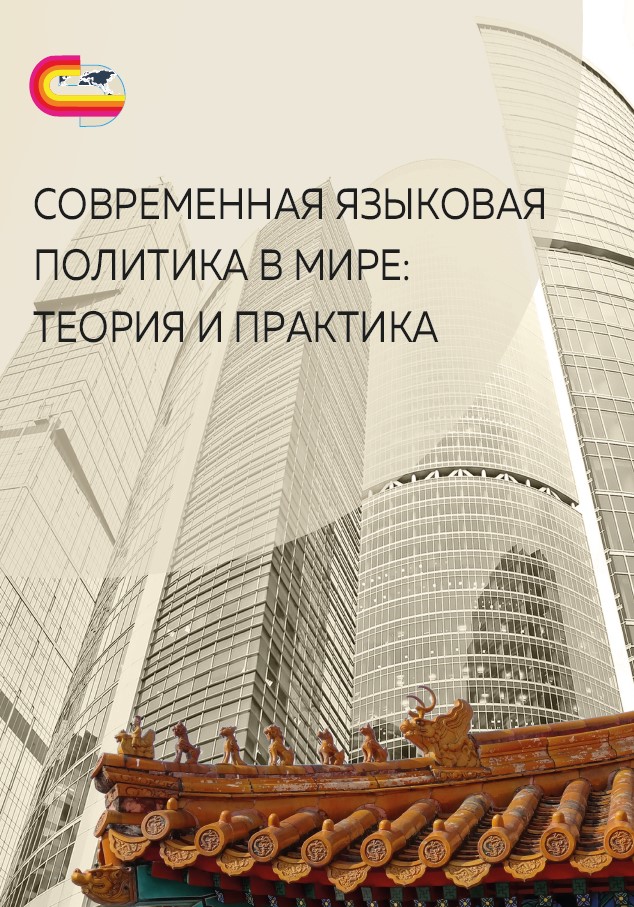Information about ex. editors:
Maria Ya. Kaplunova
Maria Ya. Kaplunova, PhD in Philology, Associate Professor, Researcher, Research Center on Ethnic and Language Relations, Institute of Linguistics of the RAS, B. Kislovsky per., 1 building 1, 125009 Moscow, Russia.
ORCID ID: https://orcid.org/0000-0002-1481-0624
E-mail:
Zhao Ronghui
Zhao Ronghui, Phd, professor, Shanghai international studies university (SISU), executive director of China center for language planning and policy studies (CCLPPS), 550 Dalian Rd., 200083 Shanghai, China.
ORCID ID: https://orcid.org/0000-0001-9605-9469
E-mail:
Abstract:
The international joint research presents the general principles of modern approaches for investigating the language policy of multi-ethnic countries in general and the Russian Federation in particular, analyzes the specific features of the language policy and language legislation of the Russian Federation and foreign countries. Particular attention is paid to various aspects of modern language planning in the post-Soviet space, including the analysis of language functioning in international organizations, in social networks, as well as in the context of the language competition and national security issues. A separate chapter is devoted to the experience of implementing the language policy of multi-ethnic countries in relation to urban space.
Keywords: language legisltation, language policy, sociolinguistics, urban space.
TABLE OF CONTENTS
Preface
Chapter I. Language Policy: Concept and Method
Language Policy in Modern Society and Small Languages (Vladimir M. Alpatov)
On the Implementation of Ethno-Linguistic Policy in Modern Russia (Vida Yu. Mikhalchenko)
New Goals and Methods of Language Policy Research (Aysa N. Bitkeeva)
Russian Sociolinguistics in the XXI Century: New Themes, Approaches, Methods (Erzhen V. Khilkhanova)
Prospects for Big Data Analysis Methods Application in the Research of Language Policy of Multiethniic Countries (Maria Ya. Kaplunova)
Methods for Measuring the Conflictogenic Potential of a Language Community (Svetlana V. Kirilenko)
Chapter II. Language Policy and Language Legislation in the Russian Federation
New in the Russian Language Legislation (Maria V. Oreshkina)
Language Policy in Russia after the Constitutional Amendments of 2020: Beginning of a New Stage? (Konstantin Zamyatin)
Laws on Education as a Tool of the National-Language Policy of the Country: 2000–2020 (Maria A. Goryacheva)
Repertoire and Scope of Functions of the Languages of the Peoples of the Russian Federation in Schools in Moscow: 2011/12–2021/22 Academic Years (Maria A. Goryacheva)
Languages of Dagestan: Threats, Challenges, Prospects (Boris M. Ataev)
Language Biography of the Kalmyks: the Experience of Revitalizing the Native Language (Tsagana D. Mandzhieva)
Republic of Tyva: Interaction of Languages in the Context of Language Construction (Checheck S. Tsybenova)
Digital Presence: Prospects for the Vitality of a Regional Language (Olga B. Yanush)
Chapter III. Language Policy in the Post-Soviet Space
Language Policy of the Republic of Kyrgyzstan for the Next Five Years: Priorities and Implementation (Wang Tianju)
Contemporary Language Policy of Turkmenistan (Chang Xianmin, Xia Helin)
On the Question of Language Competition in the Republic of Tajikistan (Zhang Liwei)
Modern Language Policy towards Russian in the Context of National Security of the Russian Federation (Zhao Liu)
Language Policy of The Shanghai Cooperation Organization (Ayixiren Jumabayi, Zhao Liu)
The Language of Social Networks of Migrants from Central Asia in the Context of Russian Urban Multilingualism (Erzhen V. Khilkhanova)
Chapter IV. Language Policy and Language Situation Abroad
Review of Studies on Public Signs in China (Liu Lifen, Li Ruiru, Wang Haijiao)
On Standardization of Russian Geographical Names in Japan (Elena S. Rufova)
Ethnographic Study of the Language Policy of the Kyrgyz Urban Families in China (Ayixiren Jumabayi)
Linguo-historical Analysis of Oikonyms in Great Britain (Svetlana V. Kirilenko)
Chapter V. Language Policy in the Context of Urbanization in the 21st Century
Urban Place Names as a Language Policy Issue (Yue Qu)
Sociolinguistic Study of the Language of the City within the Framework of the Russian Scientific School: Modern Developments (Nina I. Ivanova)
The Urban Space of Krasnoyarsk in Discourse for “Ours” and “Others” in Russia-based Media Texts in Russian and English (Anastasia V. Kolmogorova, Marina I. Melnikova)
The Influence of Ethnic Processes on Urbanization in the Republic of Bashkortostan (Nailya G. Iskuzhina)
Urbanimic Component of the Linguo-Cultural Space of the Modern City in the Aspect of Information Ecology (Elvina A. Salikhova)
Formation and Current State of the Linguistic Landscape of the City of Ulan-Ude (Vyacheslav V. Ivanov)
Chinese Language in the Linguistic Landscape of Moscow (Maria Ya. Kaplunova)
Toponyms of the Krasnoyarsk Territory in the Onomastic Consciousness of Chinese Tourists: Methods of Commercial Nomination in the Translation Aspect (Elena V. Chistova)
The Language Landscape of Modern Khorog: Toponymic Data (Leyli R. Dodykhudoeva)
Linguoculturological Aspects in the Study of the Ergonymicon of the Brest Region (Inna L. Ilyicheva)



